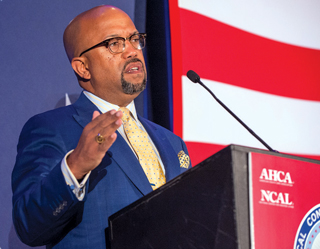
The American Health Care Association is pushing to get an additional $15 billion injected into the Provider Relief Fund for skilled nursing and assisted living facilities in order to boost recovery throughout the industry.
“We feel that if we had that level of resource that would give us enough runway to get us to the place of census recovery,” Clif Porter, AHCA’s senior vice president of government relations, said.
His comments came while speaking Friday during the National Association for the Support of Long Term Care’s (NASL) 2021 Legislative and Regulatory Conference.
Porter said the long-term care sector is in the “aftermath” of COVID and the top priority for providers is rebuilding census following an “extremely difficult” operating environment caused by the public health crisis.
Average nationwide census reached about 80% nationwide before the pandemic, but bottomed to about 67% in 2020. Average occupancy sat at about 69.3% as of early April, according to AHCA’s estimates.
“When you look at 2021, this is the year of sort of the aftermath. Thank God we are in a position where the impact, particularly as it relates to the prevalence of the virus, has plummeted. We’re not losing people anymore — thank God,” he said. “In reality, we’re beginning to recover from that.”
Porter explained that having a strong census makes operating much easier for providers, and that the additional relief funding would serve as a much-needed boost toward stability.
“We’ve slowly been climbing out of this hole in 2021 and it’s been slow, painfully slow, but the good news is the trend is our friend and it’s moving in the right direction,” he said. “When we talk about getting back to normal, the faster [census] can get back to the high 70s, low 80% mark … things will get a lot more stable for our sector.”
Other top Congressional priorities for AHCA include supporting states in obtaining their local stimulus funding and pushing the Care for Our Seniors Act that it proposed with LeadingAge.
“This whole process and experience has absolutely sort of changed the way that we think and view healthcare at large and I think one of the things that I’m probably most proud of is the fact that we — particularly in 2020 — I feel like that we did make a difference,” he said.





